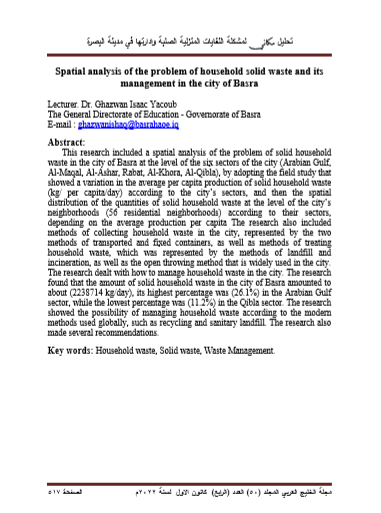Spatial analysis of the problem of household solid waste and its management in the city of Basra
Keywords:
Household waste, Solid waste, Waste ManagementAbstract
This research included a spatial analysis of the problem of solid household waste in the city of Basra at the level of the six sectors of the city (Arabian Gulf, Al-Maqal, Al-Ashar, Rabat, Al-Khora, Al-Qibla), by adopting the field study that showed a variation in the average per capita production of solid household waste (kg/ per capita/day) according to the city’s sectors, and then the spatial distribution of the quantities of solid household waste at the level of the city’s neighborhoods (56 residential neighborhoods) according to their sectors, depending on the average production per capita The research also included methods of collecting household waste in the city, represented by the two methods of transported and fixed containers, as well as methods of treating household waste, which was represented by the methods of landfill and incineration, as well as the open throwing method that is widely used in the city. The research dealt with how to manage household waste in the city. The research found that the amount of solid household waste in the city of Basra amounted to about (2238714 kg/day), its highest percentage was (26.1%) in the Arabian Gulf sector, while the lowest percentage was (11.2%) in the Qibla sector. The research showed the possibility of managing household waste according to the modern methods used globally, such as recycling and sanitary landfill. The research also made several recommendations.




